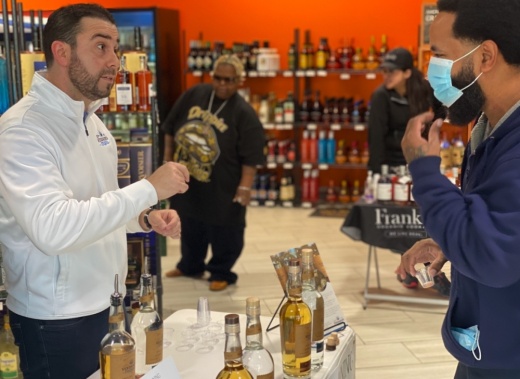Two companies started their own brands and distributorships in the city, and the owners of both said they have continued to grow their product sales and recognition.
Last July, Round Rock resident Sean Barber launched a brand called Verdadero Tequila, and in February 2020, Peter Trevino, Angel Gallegos and Sylvester Palacios launched Dos Cuernos tequila after building the brand since 2014.
As other local distilleries and bars in Pflugerville look at potentially creating tequila brands of their own, local experts say continued growth in this area could be great not only for Pflugerville’s reputation but also its economy.
“Definitely tequila [is] having a moment,” Barber said. “That trend is only growing. We don’t know when it will plateau, let’s put it that way, but the trajectory has been really strong.”
A growing thirst for tequila
Pflugerville resident Christian Rodriguez said over the last several years he has noticed a definitive shift in how people consume tequila.
Rodriguez is a bartender at El Taquito Urbano in Pflugerville, and he said he has watched customers go from shooting tequila to more recently developing greater curiosity about its nuances.
“They want to know what we have, what kind, where it’s from,” he said. “It’s kind of interesting to see, because the way I grew up, it was like, shoot it.”
Figures from the Beverage Information Group, a collection of national publications that reports on the alcohol industry, show the rate of consumption of tequila throughout Texas has grown more than 88% from 2010-20.
Similarly, data on U.S. consumption projects the market footprint for tequila will grow more than 127% from 2020-28.

Gallegos and the team at Dos Cuernos said they could not provide sales figures for their company—the company prefers to keep those figures close to the vest—but Barber said his sales have grown steadily, about 80% per month, since Verdadero launched last July.
As of mid-February, Barber said Verdadero is selling in more than 60 retail locations and several bars and restaurants throughout Central Texas.
Palacios said sales have been accelerating since they began distributing.
He said a combination of efforts including heavy social media marketing on Facebook and Instagram has helped Dos Cuernos with its early success.
“I do know that in our first year, when we launched in 2020 and our bottles arrived in February of that year, toward the end of the year we were sold out,” Palacios said.
Local distribution
Though Barber officially launched Verdadero Tequila in July 2021, he said he had been working on creating the brand since 2017. It has been difficult to break into the local market, but he cited his years of manufacturing experience and other business training as a major help.
“I’m not in the Spec’s of the world or Twin Liquors yet,” he said. “I’m just focusing on independent [liquor stores] to build a footprint.”
Gallegos and his team have also been building their company and brand since starting in 2014, but did not begin selling and distributing Dos Cuernos until right before the COVID-19 pandemic.
“Tequila just kind of made sense to us,” Gallegos said. “I formed the company at maybe 4 o’clock in the morning after tossing and turning, thinking about it.”

After a launch party at Pflugerville Mexican restaurant El Rincon in March 2020, Dos Cuernos was in its first liquor store in the Wells Branch neighborhood of North Austin, Gallegos said.
With the exception of a recent stall in bottle delivery from the distillery they use in Mexico, Gallegos said the brand has been gaining steady momentum since its launch and has been sold throughout Central Texas, including businesses, bars and restaurants in Pflugerville and Round Rock, Gallegos said.
Looking ahead, Gallegos said he would like to see Dos Cuernos expand statewide into other major markets, including Dallas and Houston, as well as nationally.
From Mexico to Pflugerville
For tequila to be authentic, Palacios said it must be made from the blue agave plant in one of five states in Mexico, with the southern state of Jalisco accounting for the lion’s share of production worldwide. Any agave-based beverage made outside of Mexico cannot technically be called tequila.

After touring five distilleries in Jalisco, Palacios said they chose a distillery called Hacienda do Oro to produce their brand.
“We fell in love with the family and fell in love with the distillery, and we said, ‘We’re going to work with you guys,’” Palacios said. “And then they crafted a recipe for us.”
Verdadero Tequila is also made in Jalisco at a distillery called Casa Maestri.
Barber said he wanted a facility that did not use what are called diffusers, or ovens that can cook high volumes of agave, the main ingredient in tequila.
Because Barber prefers a slower method, he said he eventually found Casa Maestri, which helped create 100% blue agave-based recipes for his two different varietals—blanco, a clear type of tequila that works well mixed in cocktails, and reposado, a darker type of tequila that lends itself to sipping.
“I wanted to bring a tequila to the market that is made in traditional ways, and we don’t skimp on the process or the ingredients,” Barber said. “That was basically how we arrived [at the finished product].”
Potential for more local brands
Jim McDonald, co-owner of Pflugerville wine bar Three Legged Goat, said his establishment plans to carry Dos Cuernos tequila as soon as it acquires its liquor license.
He also does not rule out forming a partnership with another maker and running a private label of tequila distributed out of Pflugerville, but there are no definite plans for that as of now, he said.
“I think it would be great just in terms of a national audience to find a solid Texas product with a cool brand on it,” McDonald said. “But, we haven’t laid the groundwork for it.”
Likewise, Shaun Siems, president and founder of Spirit of Texas Independent Distillery in Pflugerville, said he would not rule out either distributing a tequila or creating a spirit made from blue agave.

Siems said in recent years, he has noticed many more companies importing and distributing tequila, and he recently looked into importing a tequila product from a distillery in Jalisco, but ultimately did not move forward.
As of now, Siems said many options are still in play for Spirit of Texas, which mainly makes rum and whiskey, including products that would contain the same ingredient base as tequila, such as ready-to-drink •cocktails in a can.
“I think tequila would really be a brand I would like to try to do something with someday,” he said. “We couldn’t call it tequila, but there are some other successful distilleries in Texas that have come out with blue agave spirits, which is basically the same thing.”
Amy Madison, executive director of the Pflugerville Community Development Corp., said having a cluster of companies in a given area that are similar in nature is great for local and regional economic development.
As one example, Madison said having Spirit of Texas in Pflugerville has brought recognition to the city through the various spirits the distillery produces, including whiskey and rum.
Madison also pointed to an economic incentive deal brokered through the PCDC that will see construction begin in Pflugerville this July on a 250,000-square-foot facility for large-scale wine and spirits distributor Republic National Distribution Co.
Any time an area gains recognition for a unique product, be it beer or barbecue or liquor, that will often have a positive effect on tourism, which in turn pumps more sales and sales tax revenue to a local economy, she said.••“We’ve seen what happens when—in Texas we have great barbecue,” she said. “[Tequila] is another way of bringing in people to try different varietals.”





